- Home
- Lynne Olson
Those Angry Days Page 43
Those Angry Days Read online
Page 43
When the legislation was brought to the House floor for a vote on August 12, the chamber’s galleries were packed with uniformed soldiers and black-clad members of mothers’ groups. The atmosphere was extremely tense. As Rayburn took the Speaker’s chair, he had no idea whether he and James Wadsworth had rounded up enough support to pass the bill. To win, it would have to attract twenty or more Republican votes, which Wadsworth had frantically been working to get. Although the GOP had formally opposed the legislation, minority leader Joseph Martin, who personally felt that the extension was necessary, had told his Republican colleagues to “follow your own preferences on this.” But House isolationists predicted that no more than a dozen Republicans would vote for it, and Democratic whip Pat Boland told Rayburn he had no clue how many Republican votes they could count on.
As the clerk called the roll, the vote seesawed back and forth. In the press gallery, reporters compared notes: some had tallies showing the extension winning, others had it losing. The only thing they could agree on was that the final margin would be razor-thin.
After reading all the members’ names, the clerk went back through the list a second time, repeating the names of those who had not yet voted. When he was finished, he wrote the numbers on a piece of paper and handed it to Rayburn. But before the Speaker could announce the results, a Democratic member rose, asking to be recognized. When Rayburn called on him, the congressman changed his vote from aye to nay—a step that is permitted until the final tally is announced. Rayburn looked down at the paper; with this change, the vote stood at 203 for the bill and 202 against. Just then, another member jumped up. Realizing that the measure’s fate was in the balance, Rayburn ignored the man, who was now frantically waving his arm, and recognized instead a Republican deputy whip, who asked for a recapitulation of the vote (a routine motion to determine that each member’s tally had been recorded correctly).
The motion was Rayburn’s lifeline, and he grabbed it. He quickly announced the tally, declared “the bill is passed,” and ordered the recapitulation. Only then did the legislation’s opponents realize that they had been outsmarted. Under House rules, once the vote is announced and recapitulation is under way, no member may change his or her vote. The recapitulation showed no errors, and pandemonium reigned in the chamber. Angry Republicans rushed to the well of the House, demanding that Rayburn order a reconsideration. The bill’s advocates erupted in cheers and applause, while, in the galleries, the “mothers” screamed in fury. In the midst of the cacophony, the Speaker serenely banged his gavel and called for order. Thanks to Rayburn’s mastery of arcane House procedure, the 1.4-million-man army had been preserved. Four months later, the Japanese bombed Pearl Harbor.
Of the 203 House members voting for the extension, 21 were Republicans, who, thanks to the intense lobbying of James Wadsworth, had helped provide the critical one-vote margin for victory. Wadsworth, for his part, attributed the closeness of the tally to “cowardice” on the part of members facing reelection. As if to prove Wadsworth’s point, one congressman had written to colleagues shortly before the vote: “If you don’t watch your step, your political hide, which is very near and dear to you, will be tanning on the barn door.”
While the narrowness of the House vote was a shock to Washington and much of the rest of the nation, it was hardly an accurate reflection of the overall mood of the American people. Public opinion polls still showed a majority in favor of the extension. Indeed, a fair number of the 65 Democrats who voted against the measure personally favored its passage but, as Wadsworth noted, were too craven to take a political risk. Reportedly, some believed that the measure would pass handily without their support and were surprised by the closeness of the tally.
Among those severely jarred by the hairbreadth victory were Winston Churchill and British military leaders, who at the time of the House vote were meeting with Roosevelt and his military chiefs in Placentia Bay, off the coast of Newfoundland. The British tended to equate their parliamentary form of government with America’s very different system of separation of powers. If such a vote had taken place in the House of Commons, the Churchill government, harnessed to Parliament as it was, might well have fallen.
Roosevelt was in no such danger, but the news from Washington certainly did not inspire him to take any new, dramatic action to help the British. He rejected Churchill’s appeals to enter the war, although he promised the prime minister that he “would become more and more provocative” in the Battle of Atlantic. As a first step in this direction, he agreed to formalize the unofficial U.S. naval protection being provided to British as well as American convoys as far as Iceland.
After returning home, Churchill wrote glumly to his son: “The President, for all his warm heart and good intentions, is thought by many of his admirers to move with public opinion rather than to lead and form it.” When FDR held a press conference to assure the American people that the Newfoundland meeting had brought the United States no closer to war, Churchill dashed off a telegram to Harry Hopkins about the disheartening effect of the president’s statement on the British public and government, which he said were experiencing “a wave of depression.” The prime minister closed with this veiled warning: “If 1942 opens with Russia knocked out and Britain left again alone, all kinds of dangers may arise.”
Back in Washington, Roosevelt complained to reporters about what he saw as the public’s apathy toward the U.S. war effort. The trouble with the country, he said, is that “too many Americans have not yet made up their minds that we have a war to win, and that it will take a hard fight to win it.” In the view of many in Roosevelt’s circle, the president failed to realize that a major cause of the American people’s inertia was his failure to educate and lead them.
Shortly after the extension vote, General Marshall wrote FDR: “The public has been so confused as to the facts and logic of the situation … that something must be done to bring them to an understanding of the national emergency and of the necessity for a highly trained Army. Within the War Department organization, we are doing our best to counteract this weakness on the home front, but as it relates to the civil population … prompt action is necessary.”
Roosevelt replied: “Got any ideas?”
CHAPTER 23
“PROPAGANDA … WITH A VERY THICK COATING OF SUGAR”
Burton Wheeler was tired of losing.
Since the war began, he and his fellow isolationists had been defeated in every legislative battle they had waged over America’s role in the conflict. A major reason for those failures, he believed, was a media bias against him and his allies that prevented their message from getting through to the public. For months, Wheeler had complained about how difficult it was for antiwar activists to get fair and equal coverage; the media, in his view, were allowing the Roosevelt administration free rein to frame the discussion. The Montana Democrat was particularly critical of newsreels and movies, which he accused of a fixation on pro-British and pro-war themes.
After Roosevelt’s speech announcing Lend-Lease in December 1940, Wheeler had responded with a passionate, detailed denunciation of the plan. The newsreels ignored his response while paying considerable attention to the president’s address. “Will you kindly inform me when, if at all, you intend to carry my answer?” he demanded of Paramount News, one of the country’s largest newsreel production companies. “And what, if anything, you are going to do about carrying both sides of the controversy on pending legislation which directly involves the question of war and peace?” Charging the film industry with fomenting war propaganda, Wheeler raised the possibility of restrictive legislation unless moviemakers started displaying “a more impartial attitude.”
As the country’s most powerful creator of mass culture, Hollywood was considered an especially potent threat by Wheeler and other isolationist leaders. There was little doubt about the influence of movies: more than half of the American people saw at least one movie a week in the late 1930s and early 1940s. “We really have two ed
ucation systems in America,” Christian Century noted, “the public school system and the movies.”
In August 1941, Senator Gerald Nye fanned the flames that his Senate colleague had ignited. Calling movie studios “the most gigantic engines of war propaganda in existence,” Nye demanded an immediate Senate investigation of Hollywood and what he saw as its collusion with the Roosevelt administration. “The silver screen has been flooded with picture after picture designed to rouse us to a state of war hysteria,” the South Dakota Republican declared at an America First rally in St. Louis. “The truth is that in twenty thousand theaters in the United States tonight, they are holding mass war meetings.”
As overheated as Nye’s remarks were, they didn’t come close to the incendiary quality of his comments about the movie studio heads he held most responsible for this state of affairs—men who had emigrated from “Russia, Hungary, Germany, and the Balkan countries” and as a result were “naturally susceptible” to “racial emotions.” The senator was clearly referring to Louis B. Mayer, Samuel Goldwyn, the Warner brothers, and other Jewish film moguls, who, according to Nye, “came to our land and took citizenship here” while “entertaining violent animosities toward certain causes abroad.” In the frustration he shared with Wheeler and other isolationists over the media’s negative reaction to their cause, Nye was not only declaring war on Hollywood, he was also raising the specter of anti-Semitism.
A few hours before his St. Louis speech, Nye joined Senator Bennett Champ Clark of Missouri in introducing a Senate resolution that called for a formal investigation into film and radio propaganda. Burton Wheeler, as chairman of the Senate Interstate Commerce Committee, referred the resolution to a subcommittee headed by another prominent isolationist, Senator D. Worth Clark of Idaho, who, in turn, immediately scheduled hearings.
It was now Hollywood’s turn to take center stage in the isolationistinterventionist struggle.
AS IT HAPPENED, THE senators’ allegations about the film industry’s pro-British and interventionist bent were largely true. Several dozen films depicting the evils of Nazi Germany, lauding Britain’s resistance to the German onslaught, and even suggesting the possibility of U.S. involvement in the war made their debuts between September 1939 and December 1941.
In mid-1941, Lord Halifax wrote to a colleague in London that movies in America “are doing a very good job of work in our cause.” The enthusiastic response of U.S. moviegoers to American-made feature films like A Yank in the RAF and International Squadron and British documentaries like London Can Take It! and This Is England proved Halifax’s point. In close cooperation with the administration, the studios were also producing short films promoting the current defense buildup and urging young Americans to enlist in the armed forces.
What’s more, a substantial number of prominent Hollywood figures had given their personal endorsement to the interventionist crusade. Walter Wanger, a noted independent producer and president of the Academy of Motion Picture Arts and Sciences, was an active member of the Century Group and its successor, Fight for Freedom. Also belonging to Fight for Freedom were directors Howard Hawks and William Wyler and actors Douglas Fairbanks Jr., Humphrey Bogart, Helen Hayes, Burgess Meredith, Melvyn Douglas, and Edward G. Robinson. Studio tycoons Darryl Zanuck and Harry and Jack Warner made substantial donations to the organization.
By 1941, many in Hollywood were already old hands at political activism. Five years before, energized by the growing threat of Nazi Germany, hundreds of screenwriters, directors, actors, and producers had come together to form the Hollywood Anti-Nazi League, which became the focal point of liberal, interventionist activity in the film community. Intent on raising the industry’s political consciousness, the league sponsored rallies, mass meetings, and letter-writing campaigns for a wide array of causes, from support of the Loyalist forces in the Spanish Civil War to backing the beleaguered Federal Theatre Project in its fight against Martin Dies’s House Un-American Activities Committee.
America First, by contrast, found it virtually impossible to recruit members in the film capital. One of the few prominent Hollywood figures who did enlist in the isolationist cause was actress Lillian Gish, who became a member of America First’s national committee. In August 1941, however, Gish resigned from the organization after informing Robert Wood that producers had made clear they wouldn’t hire her as long as she belonged to his group.
Still, the question of Hollywood’s interventionist sentiment was far more complex than Gerald Nye and other isolationist critics made it out to be. While much of Hollywood’s creative community had indeed become politically energized by the late 1930s, those with the actual power to make movies—the studio heads—were, until very late in the game, reluctant to use their products to promote any cause, political or otherwise. The first explicitly anti-Nazi film—Warner Bros.’ Confessions of a Nazi Spy—did not appear until May 1939, several years after American newsreels, radio, newspapers, and magazines had begun paying attention to the evils of Hitler’s regime. Other studios waited until mid-1940 to join the anti-Fascist parade; even when they did, the number of such films was a small percentage of the studios’ total yearly output.
Throughout the film industry’s relatively brief existence, moviemakers—protective of their profits and worried about private pressure groups and government censorship—had done their best to avoid controversy. They were particularly concerned about not offending important foreign markets, which accounted for at least half their annual revenues. In the 1930s, Germany and Italy were key outlets for American movies, and studio heads were reluctant to do anything that might anger those countries’ totalitarian leaders.
Robert Sherwood was made aware of that fact when his Pulitzer Prize–winning play, Idiot’s Delight, was optioned by Metro-Goldwyn-Mayer in 1936. Both antiwar and anti-Fascist, Idiot’s Delight, set in a small Italian hotel on the Swiss border, focuses on a disparate group of international travelers who are stranded when Italy launches a surprise air raid on Paris. To avoid annoying Italy, the head of MGM, Louis B. Mayer, ordered the story’s setting changed to an unnamed country whose inhabitants spoke Esperanto instead of Italian. There also was to be no mention of Fascism. The Italian consul in Los Angeles was given final script approval, and MGM previewed the film for representatives of the Italian government.
When Sherwood, who wrote the screenplay, was asked if he had had any collaborators, he ruefully replied, “Yes—Mussolini.” Expurgated and defanged, Idiot’s Delight was roundly panned by the critics when it was finally released in early 1939. And despite all MGM’s efforts to placate Italian sensibilities, Italy ended up banning it, as did Spain, France, Switzerland, and Estonia.
Hollywood’s self-censorship system, embodied by the Hays Office and its production code, also played a major role in keeping social and political issues out of films. Hired by studio heads in 1922 to clean up their industry after a series of Hollywood sex scandals, Will Hays, Warren Harding’s postmaster general, greatly restricted the depiction of sex, violence, and America’s social ills on the screen. “The question of public order, of public good, of avoiding the inflammatory, the prejudicial or the subversive,” Hays primly wrote, “is a problem of social responsibility everlastingly imposed upon those who would produce, distribute and exhibit pictures.”
When war began in September 1939, Hays urged studio heads to observe strict neutrality in the conflict, warning that war-related movies might prompt federal regulation and a warlike spirit in the nation. “The primary purpose … of motion pictures,” he reminded the moguls, “is entertainment.” The equally conservative Joseph Breen, who was in charge of the production code’s enforcement, informed the studios that they must respect “the just rights, history, and feelings of any nation,” including Germany and Italy.
At that point, most studio heads were not inclined to argue. Louis B. Mayer, for one, “believed movies should be an escape from the ugliness of the world,” Edward G. Robinson observed, “and should contain n
o messages except that love and fieldstone houses and gorgeous women and manly men were, in sum, God’s true purpose.” In the words of screenwriter-producer Jesse Lasky Jr., “we were always expert at closing our eyes to reality, near or far.”
But there was another factor at work—one that everyone recognized but few openly acknowledged. As Nye nastily noted, a majority of studio chiefs were Jews of Central or Eastern European descent. But instead of being susceptible to “racial emotions,” as he claimed, most had done their best to shed their Jewish pasts and blend in with mainstream American society. That was not especially easy, considering the strong streak of anti-Semitism then prevailing in the United States. Studio bosses feared that the production of anti-Nazi films, particularly those focusing on Jewish persecution, might set off a backlash against “Jewish warmongers,” which in turn would call unwanted attention to their own backgrounds and identities.
According to a poll in the late 1930s, 60 percent of Americans agreed with statements describing Jews as avaricious and dishonest, and 72 percent opposed allowing more Jewish refugees to enter the United States. “The Jews are to some extent still foreigners,” the novelist Raymond Chandler, a Los Angeles resident who had more than a passing acquaintance with Hollywood, wrote to his English publisher. “I’ve lived in a Jewish neighborhood, and I’ve watched one become Jewish, and it was pretty awful.”
THANKS TO THE MAJOR studios’ timidity toward war-related subjects, American moviegoers’ only glimpse of what was happening overseas for most of the 1930s was through the newsreels that preceded the feature films they came to see. For half a decade, the major newsreel companies, which were not subject to the feature films’ self-censorship system, had increasingly featured stories on Hitler and Mussolini and the threat they posed to peace in Europe.

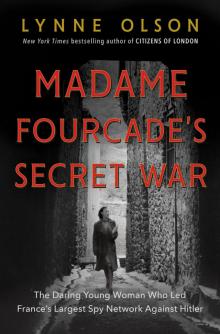 Madame Fourcade's Secret War
Madame Fourcade's Secret War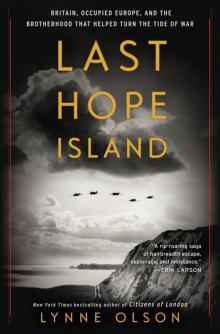 Last Hope Island
Last Hope Island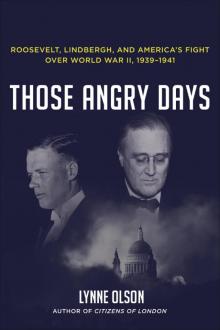 Those Angry Days
Those Angry Days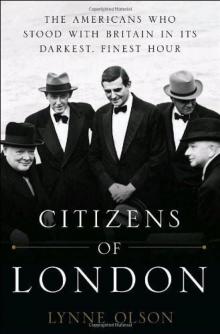 Citizens of London
Citizens of London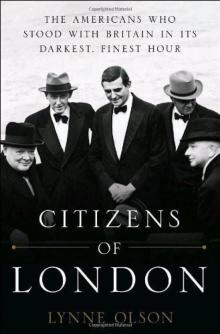 Citizens of London: The Americans Who Stood With Britain in Its Darkest, Finest Hour
Citizens of London: The Americans Who Stood With Britain in Its Darkest, Finest Hour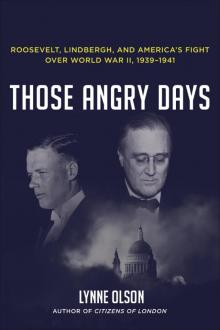 Those Angry Days: Roosevelt, Lindbergh, and America's Fight Over World War II, 1939-1941
Those Angry Days: Roosevelt, Lindbergh, and America's Fight Over World War II, 1939-1941